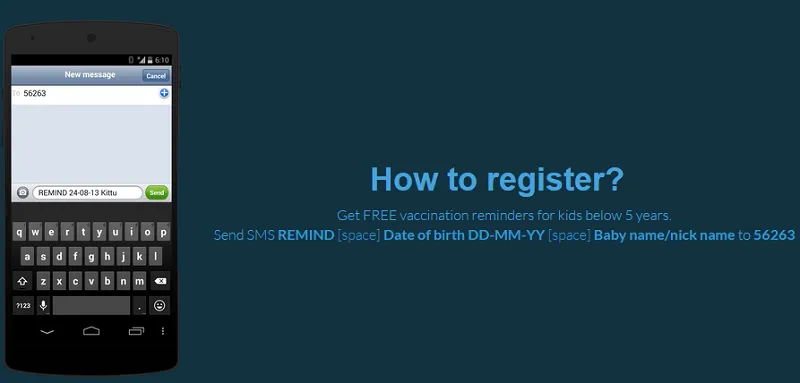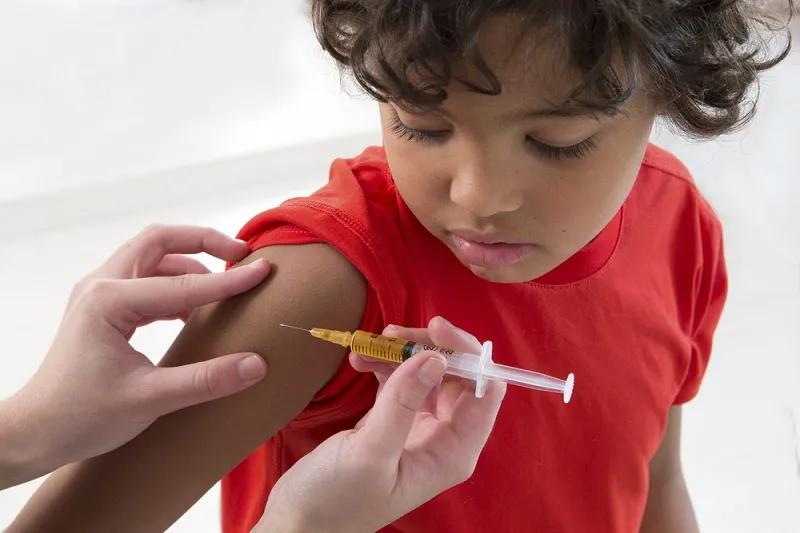Never miss your child’s vaccine – How vRemind is helping you stay on track
We often take up a cause after it pinches us personally. The story of how vRemind came into existence is no different. Nagesh Chukka missed the vaccine for his child. Feeling miserable, he checked with some of his friends and colleagues about how they tracked immunization schedules. Nagesh’s colleague, Srinivas also experienced the same problem.
The technology enthusiasts thought of building a mobile app for themselves. While that did solve their problem, what hit them is that according to Unicef, India has the largest number of unimmunized children (6.9 million), a number greater than that of Pakistan and Ethiopia. More data from Unicef reveals that 30% of the deaths in children under 5 years are due to preventable diseases. Even though the Govt. of India, under its Universal Immunization Program (UIP) provides free vaccines, yet immunization coverage in India is still low. The missing link is timely vaccines. This fatality rate can be brought down drastically if the immunization schedule for preventable diseases such as diphtheria, tetanus, whooping cough and measles is followed. Understanding that the problem plagues rural as well as urban India, Nagesh and Srinivas reworked their solution for the masses and came up with vRemind, an SMS based solution that helps parents and guardians keep track of immunization schedules.
The solution: Simple yet effective
It is a two pronged approach with registration and reminders.
Registration – multiple channel registration
- Sending SMS to vRemind short code (56263) with message REMIND [space] Date of birth DD-MM-YY [space] baby’s name/nick name
- Registering on the website – www.vRemind.org
- Healthcare partners to enroll all birth details at the time of birth.

Reminders
- vRemind sends two reminders. The first one is 7 days before the due date and the second one is one day before the due date.
Collaboration, Impact and revenue model
Apart from being an independent entity, they have collaborated with healthcare providers for reaching a wider audience. One of their partners is LifeSpring Hospitals, which has 12 branches in Hyderabad and provides low cost maternity care for the poor in urban areas. The impact has been immediate. LifeSpring saw a sudden surge in parents bringing their children for vaccination. Srinivas adds, “Initially the LifeSpring hospitals had operational challenges to accommodate the volume spike. They didn’t expect that the simple SMS system can bring about such a huge change.” This validated Nagesh and Srinivas’s belief about the impact.
Nagesh adds, “Besides helping parents we are helping hospitals in planning and prioritizing their inventory and staff to provide immunization coverage. Our vision is to help to address challenges in vaccine supply chain; this is evident in rural and far flung areas. ”

vRemind have over 10,000 subscribers and about 31,000 SMS reminders have been sent till date. According to the data, awareness about immunization increased significantly among these subscribers who have now been following the schedule. vRemind is also working with the local communities in urban slums of Hyderabad to improve awareness about immunization by organizing community reach programs.
vRemind offers provides subscription models and white labeled solutions to hospitals, which will generate revenue to sustain operations. However, vRemind will continue to send free vaccination reminders for the parents and guardians who are registered directly with them.
Challenges
Srinivas tells us about the current challenges. The first one being frequent SIM change in rural areas. Second being the mobile phones network penetration and usage in rural and being non-reachable is still a challenge. Srinivas adds, “India is a diverse country and requires multi-language support for easier penetration.”
Nagesh adds another interesting point, “We’re often asked about why we do this for free and why did we choose vRemind as a not-for-profit. It’s still hard for many to believe in the concept of “social enterprise” and its motives to address key challenges in the society.”
Coming up from their kitty
They are working with a business school professor to find out the impact of their project. This will also include exploring more mediums to improve immunization coverage. Nagesh says, “We want to find out what are the other modes, be it IVR or support of multi-language or community reach programs to help improve the awareness and adherence.”
Next on the agenda, vRemind hope to provide the prenatal reminders to pregnant women. Targeting the issue of Malnutrition, vRemind plans on branching into giving nutritional advice to pregnant women and to mothers with young children.
Srinivas tells us, “We are partnering with more low cost maternity and pediatric clinics to increase reach. We’re also looking to partner with government organizations and international NGO’s.” Nagesh adds, “To improve the coverage and reach, we need to enable multi-language support and IVR support for those who can’t read SMS. We’re also going to focus on least immunized states on priority and improve the immunization coverage to optimal level before we aim for full immunization.”
While technology is not necessarily the answer to all the problems, it has been key in breaking barriers to entry and acted as a cost effective enabler. Providing an add-on feature like timely reminder coupled with Universal Immunization Program (UIP) has the potential to break the plateau and see an exponential rise in immunization levels, which will consequently reduce mortality rates in children under 5 years. Nagesh and Srinivas plan on taking vRemind global and visualize it to be the go-to affordable mobile health platform.







